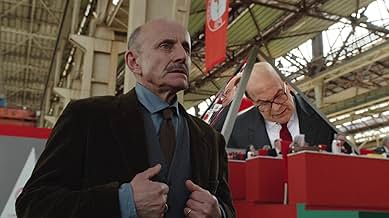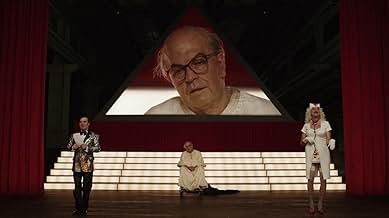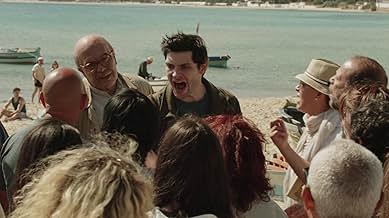Hammamet
- 2020
- 2 h 6 min
AVALIAÇÃO DA IMDb
5,8/10
1,9 mil
SUA AVALIAÇÃO
O último ano de vida do Bettino Craxi, um dos mais importantes e controversos líderes italianos dos anos 80.O último ano de vida do Bettino Craxi, um dos mais importantes e controversos líderes italianos dos anos 80.O último ano de vida do Bettino Craxi, um dos mais importantes e controversos líderes italianos dos anos 80.
- Direção
- Roteiristas
- Artistas
- Prêmios
- 8 vitórias e 18 indicações no total
Avaliações em destaque
Francesco Favino has definitely delivered a great acting, but regarding the script and the whole story, a continuous lack of history documentation and a very poorly report on what was going on during those years. Also an overrated point of view of a man that didn't escape from justice only but from the fear of what he did more than anything.
If you grant (a lot of) indulgence to the controversial protagonist, you'll enjoy this nostalgic movie (Amelio is the right director), taste some subtleties, and praise the great performance of the lead actor - "adesso li fa tutti Favino", and for a very good reason - and the whole cast.
On the other side, even forgetting about history, you'll also notice the flaws: the most important political facts are just fainted, the identities are hidden (even ridiculously, as for Craxi's sons), there's no real plot (the Vincenzo's son escamotage does not work) which contribuites to the image of a insufferable crumbling king
If you don't know much about Bettino Craxi's life and political actions, it can be quite difficult to keep up with the story of this film. The story concentrates only on the character of Craxi and his point of view on the scandal that he was part of. Gianni Amelio tried to compose this film basically only from the thoughts and philosophical monologues of Craxi without any real plot or twist, which I must say became pretty tiresome after 60 minutes. It is obvious the whole film heavily relies on Pierfrancesco Favino as Craxi (who was simply masterful), but I wish it had more to it than just a great acting performance. I was also questioned by the mysterious character of the son of one of Craxi's former friends, who seeks truth about Craxi and also his own father. Perhaps this character should represent viewers or people affected by his actions also looking for the truth, but it felt like this character didn't really fit the whole atmosphere of this picture. If it had been at least 15 minutes shorter I would have mabe recommended it, but in spite of Favino's great performance this film feels quite forgettable.
Most contemporary Italian movies suffer from lack of a tight script or at the very least a story with a start, middle and ending. Way too often they are assembled as a series of loosely knit sketches or rambling, confused tales. This one belongs to the second category.
After a promising start, where the Italian Socialist leader Craxi is shown at the height of his power, the scene changes abruptly to Hammamet several years later, with the politician as a broken, disgraced, sick man living in a large villa with tight security. I had to read the synopsis to learn that none of the "real" people involved in the story are called with their real names (?) for unspecified reasons and it is only because I have a vague knowledge of the facts that I know how Craxi ended up in Tunisia.
However, the narrative fails miserably in the "show, don't tell" department, with relevant episodes of the past narrated by Craxi to the fictional character of a half crazy son of an ex-party member. This part of the plot, with the crazy guy filming Craxi's narration of his memory is irritating because one doesn't get a coherent story.
One must be an expert of Italian history in the late 80s/early 90s to understand what happened, otherwise it's next to impossible to follow (even for me, and I am Italian).
Even more irritating are the vapid dialogues of Craxi and the annoying grandchild, the dragged scenes on the beach and around Hammamet, all skimming the surface and never getting to the point - but what was supposed to be the point? The only positive note is main character, the unnamed President (aka Craxi) played with astonishing resemblance to the real person by a very chameleonic actor who disappears in the part. The rest is diluted fluff.
After a promising start, where the Italian Socialist leader Craxi is shown at the height of his power, the scene changes abruptly to Hammamet several years later, with the politician as a broken, disgraced, sick man living in a large villa with tight security. I had to read the synopsis to learn that none of the "real" people involved in the story are called with their real names (?) for unspecified reasons and it is only because I have a vague knowledge of the facts that I know how Craxi ended up in Tunisia.
However, the narrative fails miserably in the "show, don't tell" department, with relevant episodes of the past narrated by Craxi to the fictional character of a half crazy son of an ex-party member. This part of the plot, with the crazy guy filming Craxi's narration of his memory is irritating because one doesn't get a coherent story.
One must be an expert of Italian history in the late 80s/early 90s to understand what happened, otherwise it's next to impossible to follow (even for me, and I am Italian).
Even more irritating are the vapid dialogues of Craxi and the annoying grandchild, the dragged scenes on the beach and around Hammamet, all skimming the surface and never getting to the point - but what was supposed to be the point? The only positive note is main character, the unnamed President (aka Craxi) played with astonishing resemblance to the real person by a very chameleonic actor who disappears in the part. The rest is diluted fluff.
Who controls the present controls the past, Orwell wrote in 1984.This movie is a courageous attempt to restore Bettino Craxi as a human being, after having been politically destroyed by left-wing judges in the only judiciary-driven coup of Italian history. In itself is not much more than a documentary but Favino puts such heart and soul into his character that makes the movie enjoyable and didactic.
Você sabia?
- CuriosidadesThe disabled tank visited by Craxi and Fausto Is a real relic left in the desert near Hammamet. It is obviously an old Patton tank, presumably belonging once to the Tunesian army: as such, it couldn't have seen action in WW2, as Craxi recounts.
- ConexõesFeatures Fuga do Passado (1947)
Principais escolhas
Faça login para avaliar e ver a lista de recomendações personalizadas
Detalhes
Bilheteria
- Faturamento bruto mundial
- US$ 6.434.874
- Tempo de duração2 horas 6 minutos
- Cor
- Proporção
- 1.85 : 1
Contribua para esta página
Sugerir uma alteração ou adicionar conteúdo ausente


![Assistir a Trailer [OV]](https://m.media-amazon.com/images/M/MV5BNDJmNGYyYzMtM2FmMy00ZjAwLWFkZWMtOWY5NjJlMTdhZjA3XkEyXkFqcGdeQXRyYW5zY29kZS13b3JrZmxvdw@@._V1_QL75_UX500_CR0)























